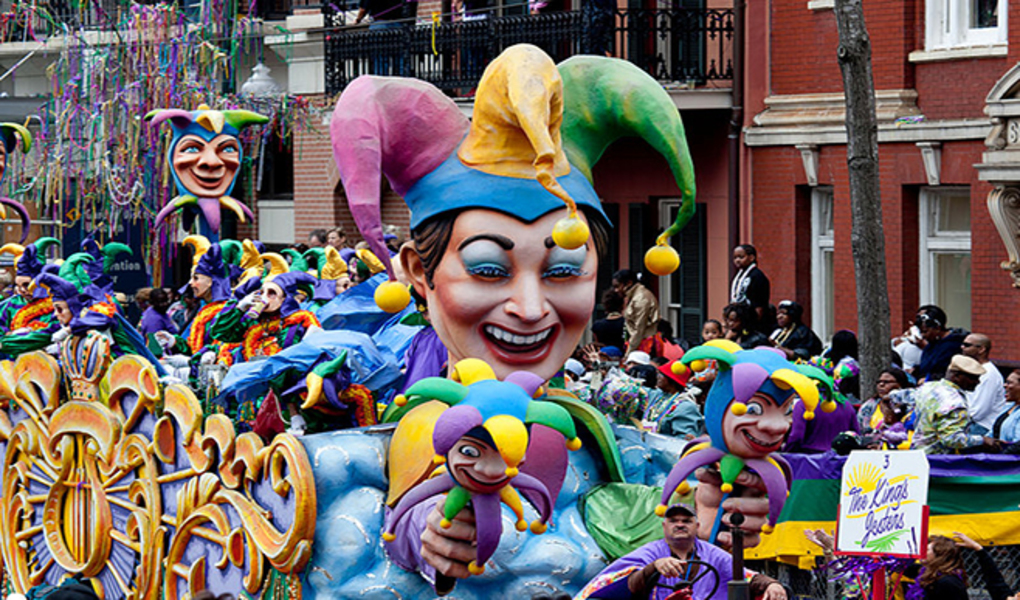French architecture and culture influence the Louisiana city of New Orleans. Spend just a few hours in this city, you’ll quickly figure out why it earned its nickname as the “Big Easy. It is also known as the Crescent City, which you won’t be obvious unless you’re looking at it from up above - it has a moon-like shape that borders the Mississippi River. From its always-on nightlife and Mardi gras season to its spicy cuisine and spectacular music scene, it’s easy to fall in love with NOLA. If you’re considering a big move, there are many reasons why New Orleans would make the perfect new place to settle down. Here are ten things to consider before you make the big move to the city:
There are a lot more bugs than you would think
If you plan on moving to New Orleans, be sure to pack lots of bug spray. Dealing with insects is one of the most unique features of living in New Orleans. We’re not talking about ordinary bugs here. The bugs in New Orleans are tremendous. The Palmetto Bug, also known as a flying roach, is one of the most well-recognized insects in the city. In fact, New Orleans is the most roach-infested city in the U.S. You’ll be trying to get these little creatures out of your home on a regular basis. Boris acid can help with this bug problem. It is low in toxicity and works well to on the Palmetto Bug as well as a wide range of insects. Be sure to stock up on it well in advance of your move to New Orleans. As if the Palmetto Bug wasn’t a big enough problem, billions of bugs swarmed the city last year. Known as ‘blind mosquitoes’, these aquatic midges can be annoying to deal with but they aren’t harmful. In fact, they are pretty good for the environment. Living in a mini version of Jurassic Park may seem like a lot to deal with but residents of New Orleans but with a good pest control company, you’ll be fine.
The food and drinks are delicious but you can really pack on the pounds

Traditional New Orleans food is absolutely mouthwatering, but also very high in calories. It’s not uncommon for most transplants to the city to gain weight after indulging regularly in the best food in the city. People in New Orleans really know how to enjoy sweets and have made it a part of their cultural celebrations. As a part of Mardi Gras celebration, each Friday in January and February is designated os King Cake at Work Fridays.
Given it’s heavy Creole influence, famous New Orleans dishes include gumbo, jambalaya, crabfish,crawfish, and red beans and rice. If you’re having trouble deciding which ones to try first, check out these 10 famous foods in New Orleans to add to your culinary bucket list. Despite the popularity of fried food in the city, it is still possible to eat healthy. There are many vegan and vegetarian options just about everywhere you will visit in New Orleans.
Mardi Gras isn’t just a one-day celebration
The tradition of Mardi Gras in New Orleans dates back as far as March 2, 1699 when the first recorded celebration was held in Louisian on the Mississippi River. The historic New Orleans tradition may be marked by Fat Tuesday but the festivities are not contained to that one day. Mardi Gras actually starts on January 6 and lasts all the way until Fat Tuesday, which will be on February 25 this year. Each year, the celebration attracts people from all over the world. The Mardi Gras parade features outdoor concerts with national as well as local Louisiana artists. The parades are organized by krewes, which are social organizations formed specifically to plan events related to the carnival season. You may not be prepared to make the move before Fat Tuesday, but you can still visit to enjoy the celebrations before you become an official New Orleans resident. Check out the official Mardi Gras schedule to all the upcoming festivities. There are lots of cultural celebrations in addition to Mardi Gras. If you have a passion for music and the arts, then you are picking the perfect place to relocate.
There are no beaches, at all
If a daily dose of sun, sand, and surf is your thing, then you may want to think twice before making a move to New Orleans. While you are not completely out of options, just know that you will have to take on a considerable drive if you want to get your tan on. If the famous Louisiana summer sun becomes too much to bear, there are some really good beaches near to New Orleans. The closest beach to New Orleans is in Mississippi on the Gold Coast, which is about an hour away. On the plus side, if you decide to move to New Orleans and are craving the beach, you’ll be able to make a nice day trip out of it with friends and family.
It has a low cost of living
If the bugs and lack of beaches were starting to bum you out, we’ve got some good news. Living in New Orleans is incredibly affordable. In fact, the city doesn’t even crack the top twenty when it comes to rental prices. In order to live comfortably there, you will need about $62,000 per year. The average monthly cost for a family of 4, excluding rent, is $3,462 while a single person can expect to spend $982. If you’re coming from a pricey city like New York or San Francisco, then these lower prices will be a welcome change. However, you are encouraged to take New Orleans’s affordability with a grain of salt. In 2015, the Atlantic warned of the myth of New Orleans’s affordability. It argued that cities with cheap housing aren’t exactly cheap if the wages remain low. There is a lack of public housing in New Orleans, which is largely due to all the damage that was caused by Hurricane Katrina. Almost 15 years later, parts of the city have not fully recovered. The price of housing has also been rising steadily since 2011. If you plan on making the move, you should do so sooner rather than later before they rise even more.
The job market is tough on young professionals
If you’re looking for opportunity and growth in your career, the city may not be the best location for you. At the moment, New Orleans is in poor economic health. In 2016, more people left New Orleans than those who moved in. The unemployment rate is slightly higher than the national average. However, it has been getting lower each year. US News ranks the job market as less health than similarly sized metro areas. Young professionals seem to be especially susceptible to the lack of opportunities as getting ahead in the job market there means that people often need connections to those in high places. For people just starting out in their career, these types of connections are not always possible. For a more indepth look at the issue, CityLab did an excellent job of dissecting just how New Orleans has failed its workers since Hurricane Katrina.
The climate may take some getting used to
If you’re coming from a cold climate, then get ready for the humid subtropical weather that the area is known to have the majority of the year. Its winters are relatively short and the summer period can get very hot and humid. In the winter months, the temperature can drop to as low as the 40s and rise to the mid-60s. Due to the humidity, expect the bite of the cold to be a littler harsher than it really is.
You’ll love Spring in New Orleans as it is the festival season. The temperature also gets a little warmer with a low in the 50s and a high of the upper 70s. It is the perfect time to explore the city. In the summertime, it is common to have lots of rain and the temperature can get as high we in the upper 90s. During Fall, the temperature will remain in the upper 80s during this very busy season of festivals, sports, and events. Due to its coastal location, New Orleans is exceptionally vulnerable to hurricanes and extreme flooding.
While the weather may be alarming, some people say the humidity is good for your skin. So, on the upside, you may be able to abandon your wrinkle cream while living in New Orleans.
Festival season lasts the whole year
Thought the celebrations were contained to Mardi Gras at the beginning of the year? Think again. There is a festival for just about everything. From Seafood Fest to the National Fried Chicken Festival, Most of New Orleans’ festivals take place during the Spring but there is always a culinary festival to enjoy. Holidays like St. Patrick Day also come with a festival celebration that lasts two weeks. All of these festivals may be a lot to keep track of but there are resources that can help. NewOrleans.com keeps an updated list of all festivals, along with general information on things to do and places to eat around the city.
Public transportation is relatively easy to access

New Orleans has many options for public transit. There are buses, bikes, ferries, trains, and streetcars. Figuring out the schedules can be a lot of work if you are new to the area. However, once you get acquainted with everything, New Orleans Regional Transit Authority (RTA) has a website that thoroughly covers available transit options, along with schedules and costs. Getting from place to place is also easy as the neighborhoods are very walkable.
Buses in New Orleans feature amenities that help passengers feel comfortable. Audio and visual aids provide updates on stops and all buses have wheelchair ramps. Pregnant women and senior citizens have priority seating and one bring a service dog id needed. If you’re up for a more laid-back journey, streetcars that were around in the 1800s are available. Ferries provide an affordable way to travel and explore the neighborhoods of New Orleans. You can get a workout in with a Blue Bike rental. The racks are located all throughout the city. Bikes can be accessed for $0.13 per minute or a subscription of $15 monthly.
The crime rate is a bit alarming
According to bestplaces.net, the property crime rate in New Orleans is nearly twice that of the national average.The rate of violent crimes is more than double the rest of the United States. Some neighborhoods are better than others. If you are considering moving to New Orleans, you may want to avoid places like Michoud Boulevard, Warrington Drive, Robert E. Lee Boulevard, Cleveland Avenue, and South Johnston Street. Unfortunately, the crime has been climbing each year. Locals have a 1 in 19 chance of becoming a victim. While nothing will make you 100% safe, there are some recommended neighborhoods that are considered safe. Look into the Garden District, Uptown, the Central Business District, French Quarter, and Chef Menteur Highway.
The decision to move can be a complicated decision. There are lots of factors to consider when deciding if you want to move the New Orleans. The bugs, economic climate, and crime rate may dissuade some people but the city has a lot of positive qualities as well. If New Orleans is ever to fully recover, it will need a steady influx of working professionals so don’t cross it off your list just yet. If you decide to make New Orleans you new home, renting a self storage unit is a good choice as it will help you to remain organized. If you need help on how to start organizing your move, check out our helpful moving tips. Whatever you decide, we guarantee you’ll have endless adventures and places to explore once you move to New Orleans.


